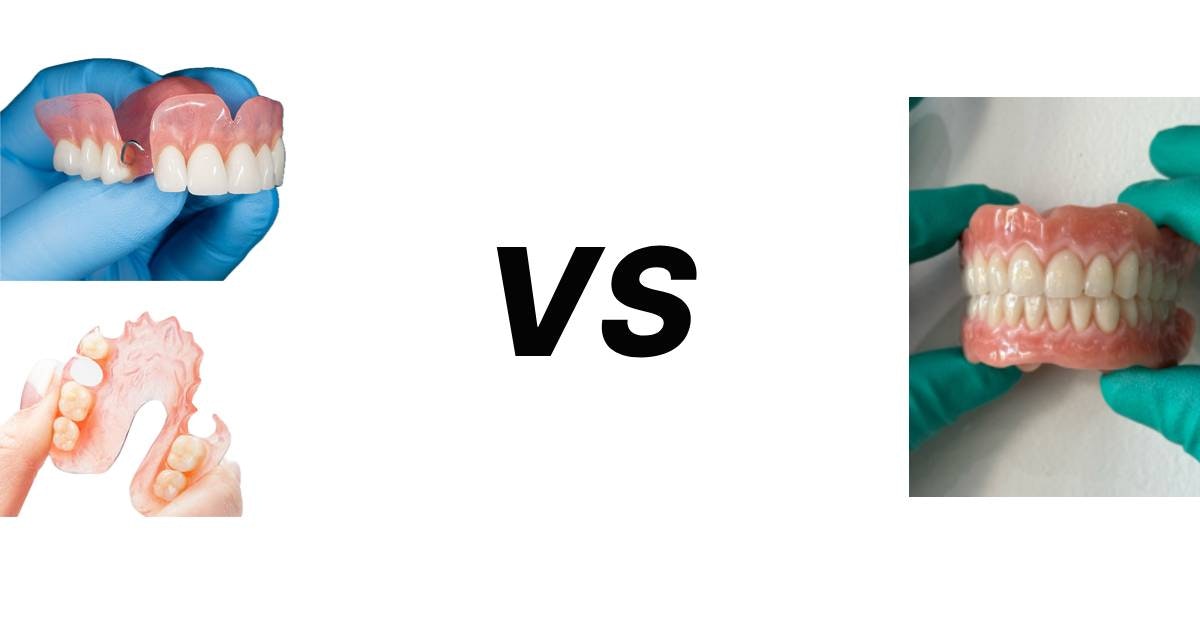Full Dentures vs Partial Dentures: Expert Guide for Melbourne Patients 2025

Medical Disclaimer
This content is for educational and informational purposes only. It is not intended as medical advice and should not be used as a substitute for professional dental care. Always consult with a qualified prosthetist or dental professional for diagnosis and treatment recommendations specific to your individual needs.
Choosing between full dentures and partial dentures is a big decision that will affect your oral health, comfort and daily life. As a certified prosthetist with over 30 years in Melbourne, I've helped thousands of patients work through this choice.
This guide explains the differences between full and partial dentures, and which might be right for you.
Understanding the Basics
What Are Full Dentures?
Full dentures (also called complete dentures) are removable dental prosthetics that replace all teeth in either the upper jaw, lower jaw, or both. They rest directly on your gum tissue and are held in place by suction, adhesive, or dental implants.
Full dentures are suitable for you if:
- You have no remaining natural teeth in one or both jaws
- Your remaining teeth are severely damaged beyond repair
- You've been advised that extracting all remaining teeth is the best option
- You want to restore full oral function and aesthetics
What Are Partial Dentures?
Partial dentures are removable prosthetics that replace one or more missing teeth while you still have some healthy natural teeth remaining. They fill the gaps left by missing teeth and are secured using clasps that attach to your natural teeth.
Partial dentures are suitable for you if:
- You have one or more missing teeth but retain some healthy natural teeth
- You want to prevent remaining teeth from shifting
- You're not a candidate for dental implants or bridges
- You need an affordable tooth replacement solution
Full Dentures: Detailed Overview
Types of Full Dentures
1. Conventional Full Dentures Conventional dentures are made after your remaining teeth are extracted and your gums have healed completely. This healing process typically takes 8-12 weeks.
Advantages:
- Better fit due to complete healing
- More comfortable long-term
- Optimal suction and retention
Disadvantages:
- You'll be without teeth during the healing period
- Multiple appointments required
- Longer overall process
2. Immediate Full Dentures Immediate dentures are prepared in advance and placed immediately after tooth extraction, so you're never without teeth.
Advantages:
- No period without teeth
- Protects extraction sites
- Immediate restoration of appearance
Disadvantages:
- May require multiple adjustments
- Less precise fit initially
- More frequent relines needed
- Higher initial cost
3. Implant-Supported Full Dentures These dentures clip onto dental implants that are surgically placed in your jawbone, giving you much better stability.
Advantages:
- Rock-solid stability - no slipping
- Much better chewing ability
- Prevents bone loss
- Feels most natural
Disadvantages:
- Higher cost ($15,000-$30,000)
- Surgery required
- Takes longer
- Not everyone's a candidate
The Full Denture Process in Melbourne
Step 1: Initial Consultation (Week 1)
- Comprehensive oral examination
- X-rays and impressions
- Discussion of options and expectations
- Treatment plan development
- Cost estimates
Step 2: Tooth Extraction (if needed)
- Performed by dentist or oral surgeon
- Healing time: 8-12 weeks (conventional)
- Or immediate denture placement
Step 3: Impressions and Measurements (Week 2-3)
- Precise impressions of your gums
- Bite relationship records
- Shade and shape selection
- Try-in appointments
Step 4: Fitting and Adjustments (Week 4-6)
- Final denture delivery
- Instructions on insertion and removal
- Care and maintenance education
- Follow-up adjustments
At Primedent Clinic, we'll do same-day adjustments if you need them, and we're here to support you throughout the whole process.
Living with Full Dentures
What to Expect:
First Week:
- Increased saliva production
- Minor discomfort or soreness
- Speaking feels different
- Eating requires practice
- May need adhesive initially
First Month:
- Gradual improvement in comfort
- Speaking becomes easier
- Chewing ability improves
- Facial muscles adapt
- May need minor adjustments
Long-Term:
- Feels natural and comfortable
- Full oral function restored
- Confidence in social situations
- Regular maintenance required
- Relines every 1-2 years
Partial Dentures: Detailed Overview
Types of Partial Dentures
1. Acrylic Partial Dentures Made primarily from acrylic resin with metal clasps, these are the most economical option.
Best for:
- Temporary tooth replacement
- Budget-conscious patients
- Replacing front teeth
- Trial dentures before final restoration
2. Metal Framework Partial Dentures (Cast Partials) Feature a metal framework (usually chrome-cobalt) for superior strength and durability.
Best for:
- Long-term tooth replacement
- Replacing multiple teeth
- Patients seeking durability
- Better fit and comfort
3. Flexible Partial Dentures (Valplast) Made from flexible thermoplastic material without metal clasps, offering superior aesthetics.
Best for:
- Patients allergic to acrylic or metal
- Front tooth replacement
- Active individuals
- Those seeking invisible clasps
The Partial Denture Process
Timeline: Typically 2-4 weeks
Step 1: Assessment (Week 1)
- Examination of remaining teeth
- Impressions taken
- Treatment planning
- Material selection
Step 2: Fabrication (Week 2-3)
- Framework construction
- Tooth positioning
- Try-in appointment
- Final adjustments
Step 3: Delivery (Week 4)
- Fitting and adjustments
- Care instructions
- Follow-up scheduled
Living with Partial Dentures
Daily Routine:
- Remove and clean after meals
- Brush remaining natural teeth
- Soak overnight in cleaning solution
- Regular dental check-ups (every 6 months)
Benefits:
- Prevents remaining teeth from shifting
- Restores chewing function
- Improves speech
- Enhances appearance
- Supports facial structure
Challenges:
- Requires care of both denture and natural teeth
- Metal clasps may be visible
- May need adjustments as natural teeth change
- Can accumulate food particles
At Primedent Clinic, we:
- Accept all major health funds
- Provide upfront cost estimates
Which Option Is Right for You?
Choose Full Dentures If:
✅ You have no remaining natural teeth or very few compromised teeth ✅ Your dentist recommends full extraction ✅ You want a completely fresh start ✅ Your remaining teeth are causing ongoing problems ✅ You're tired of ongoing dental work ✅ You want the most comprehensive solution
Choose Partial Dentures If:
✅ You have several healthy natural teeth worth preserving ✅ You want to prevent remaining teeth from shifting ✅ You need to replace 1-6 teeth ✅ You prefer a less invasive option ✅ Your budget is more limited ✅ Your natural teeth are in good condition
Consider Implant-Supported Options If:
✅ You have adequate bone density ✅ You want the most stable solution ✅ You're willing to invest in long-term oral health ✅ You have realistic expectations ✅ You're in good general health ✅ You want to prevent bone loss
Advantages and Disadvantages
Full Dentures
Advantages:
- Restores complete oral function
- Natural appearance possible
- Cost-effective compared to implants
- Can improve facial aesthetics
- Predictable results
- Well-established treatment
Disadvantages:
- Requires adjustment period
- May slip occasionally
- Some foods difficult to eat
- Requires daily removal and cleaning
- Affects taste sensation slightly
- Needs replacement every 5-7 years
- Can accelerate bone loss
Partial Dentures
Advantages:
- Preserves natural teeth
- Less invasive than full dentures
- Prevents teeth from shifting
- More affordable than bridges
- Removable for cleaning
- Can be modified easily
- Quicker treatment time
Disadvantages:
- Requires healthy natural teeth
- Clasps may be visible
- Can put stress on anchor teeth
- May accumulate food
- Requires more daily maintenance
- Less stable than implant options
- Natural teeth still need care
Maintenance and Longevity
Care for Full Dentures:
Daily:
- Remove and rinse after eating
- Brush with soft denture brush
- Soak overnight in cleaning solution
- Rinse before reinserting
- Brush gums, tongue, and palate
Regular Maintenance:
- Professional cleaning every 6-12 months
- Adjustments as needed
- Reline every 1-2 years
- Replace every 5-7 years
Care for Partial Dentures:
Daily:
- Remove and clean after meals
- Brush partial and natural teeth
- Soak overnight
- Floss natural teeth
- Use antibacterial mouthwash
Regular Maintenance:
- Dental check-ups every 6 months
- Professional cleaning
- Adjustments for comfort
- Monitor anchor teeth health
- Replace every 5-7 years
Common Questions
Can I sleep with my dentures in? It's best to remove dentures at night to allow your gums to rest and maintain better oral hygiene. However, if advised by your prosthetist for specific medical reasons, overnight wear may be acceptable.
Will people be able to tell I'm wearing dentures? Modern dentures are designed to look extremely natural. With proper fitting and quality materials, most people won't be able to tell you're wearing dentures.
How long does it take to get used to dentures? Most people adapt to full dentures within 2-4 weeks and partial dentures within 1-2 weeks. Some adjustment is normal, and we provide unlimited adjustments during this period.
Can I eat normally with dentures? Yes! After an adjustment period, you'll be able to eat most foods. Start with soft foods and gradually progress to firmer foods. Very hard or sticky foods may always require caution.
Will dentures change how I speak? You may experience minor speech changes initially, but most people adapt within a few days to weeks. Practice reading aloud to speed up the adjustment.
Can I upgrade from partial to full dentures later? Yes, absolutely. If you start with partial dentures and later need full dentures, your prosthetist can help you transition smoothly.
Making Your Decision
Choosing between full and partial dentures is a personal decision that depends on multiple factors:
Consider:
- Your current oral health status
- Number and condition of remaining teeth
- Your budget and insurance coverage
- Long-term oral health goals
- Lifestyle and dietary needs
- Aesthetic preferences
- Willingness to maintain natural teeth
Important: Always see a qualified prosthetist who can examine your mouth and give you personalised advice based on your situation.
Take the Next Step
Whether you need full dentures, partial dentures, or are unsure which option is right for you, we're here to help. Our experienced team will assess your individual situation and recommend the best solution for your needs and budget.
Contact Primedent Clinic Today:
📞 Phone: (03) 9497 9666 📍 Address: 145 High St, Thomastown, VIC 3074 🕐 Hours: Monday-Friday, 9 AM - 5 PM
Serving: Thomastown, Lalor, Epping, Mill Park, Reservoir, Preston, Coburg, Brunswick, and all Melbourne northern suburbs.
Book your free consultation today and take the first step toward restoring your smile and confidence!
This article was written by Goran, Principal Prosthetist at Primedent Denture Clinic, with over 30 years of experience in prosthodontics. Information is current as of November 2025.
Need Professional Denture Care?
Our experienced team at Primedent Denture Clinic is here to help. Book a free consultation today to discuss your denture needs.
About the Author
Goran
Principal Prosthetist
With over 30 years of experience in prosthodontics, Goran has helped thousands of patients across Melbourne regain their confidence with quality denture solutions.
Last updated:
Related Articles

Denture Cost Guide Melbourne 2025: What You'll Really Pay
Transparent pricing guide for dentures in Melbourne. Learn actual costs for full, partial, and implant-supported dentures, plus health fund coverage and payment options.
8 min read

5 Signs You Need Denture Repair in Melbourne
Learn the key signs that indicate your dentures need repair in Melbourne. Expert advice on denture maintenance and when to seek professional denture repair services from experienced prosthetists.
7 min read

How to Care for Your New Dentures: Professional Tips from Melbourne Prosthetists
Complete guide to denture care and maintenance from experienced Melbourne prosthetists. Learn daily cleaning routines, storage tips, and how to make your dentures last longer.
9 min read
